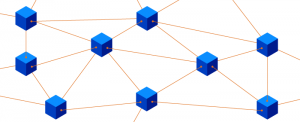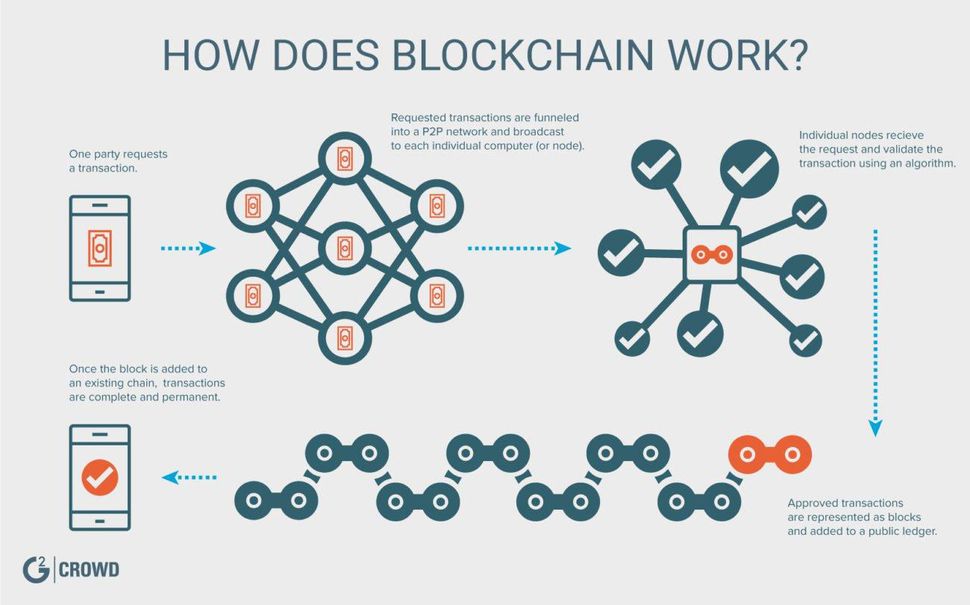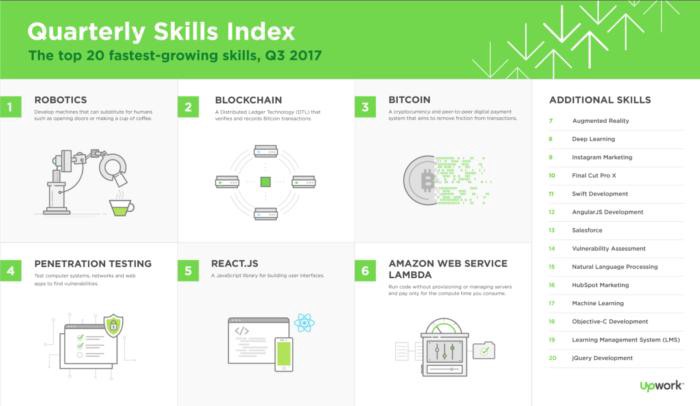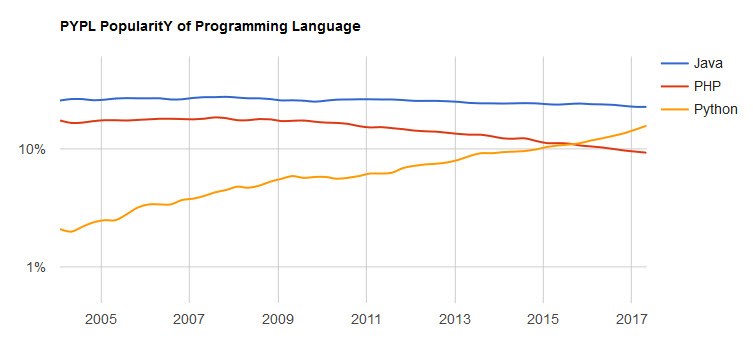 Reading Time: 9 minutes
Reading Time: 9 minutesMany financial and technology experts say that blockchain development is poised to change IT in much the way open source software did in the 1980s. A recent article in TechCrunch reported there is a massive shortage of blockchain developers. That article claimed there are 14 job openings for every blockchain developer. Also, last year the freelance site Upwork saw blockchain rise to the fastest growing skill set out of more than 5000 freelance billings. This was an increase of more than 35,000 percent from the year before.
Hackernoon reports that blockchain and bitcoin development skills were the #2 and #3 fastest-growing tech skills needed in the country.
As blockchain grows in the business world, the need for developers in many programming languages will be intense. If you are interested in developing the skills to become a part of this lucrative field, keep reading.
What Is Blockchain?

Blockchain is a public electronic ledger that is similar to a relational database that may be openly shared among many users. This creates a permanent, unchangeable record of their transactions, with each one time stamped and linked to the last one. Every digital record in the thread is referred to as a block. It allows either an open set or limited set of users to participate in the ledger, with each block linked to a certain participant. It may only be updated by consensus between the participants in the system and data can never be erased once it is entered.
What is Bitcoin?
Bitcoin is the most well-known use of blockchain technology so far. It is a cryptocurrency that allows financial transactions over an open network with encryption and digital bits. It was invented by ‘Satoshi Nakamoto’ (probably a pseudonym for several developers) who described Bitcoin as a peer to peer version of electronic currency that will allow online payments to be sent from user to user without going through a traditional financial institution.
Anything that is digital can be copied multiple times. The challenge with implementing a digital payment system is to ensure that no one spends the same money twice. Usually, this is accomplished by having a trusted authority such as Paypal verify financial transactions. What makes Bitcoin so exciting is that it uses consensus in a truly massive peer to peer network to verify financial transactions. The result: Payments are non-reversible, accounts can never be frozen, and transaction fees are lower.
Some users use their computers to verify transactions in the peer to peer network we describe above. These users are rewarded with new Bitcoins proportional to the amount of computing power they gave to the network.
Develop Blockchain Coding Skills and Make $$$$

If you can develop blockchain developer skills, you can become wealthy in many cases. Computerworld estimates blockchain developers earn a salary of $130,000 or more per year in many cases; meanwhile, software developers earn up to $105,000 per year.
Here are the average salaries for blockchain developers from major job sites:
- com: $79,985 with a range of $55,000 to $112,000
- com: $85,512, up to $110,840 per year for full stack developers
Hackernoon reports in high tech parts of the US including Silicon Valley, Boston and New York, the average salary of blockchain developers is $158,000. These are full time workers at major corporations.
Blockchain developers and engineers are finding demand in high paying work for even classic financial sector companies, such as Bank of America and Visa. Glassdoor.com states the following companies are currently hiring developers:
- Intel – Jerusalem
- Cisco Systems – San Jose CA
- American Express – NYC
- EY – London, England
- Invesco – NYC
- Hudson Data LLC – San Francisco CA
As blockchain grows and becomes more accepted across the international financial world, it is very likely demand in this field will only grow in the next decade.
That is why forward-thinking techies should be learning the new skills needed to be a blockchain developer. This article will provide you with the basics on how to become a blockchain developer and how to continue to grow your skills as this new technology grows and changes every year.
Required Skills to Become a Blockchain Developer
The top blockchain platforms today are bitcoin and ethereum. Most applications are built on one of these. There are other blockchains being developed that are not as popular yet. Bitcoin and ethereum are pubic blockchains, meaning that all users and applications are sharing the entire ledger. Meanwhile, other blockchains, such as Hyperledger, offer permissioned and private blockchains for a certain number of authorized users.

This field is all about computer science, so if you want to become a developer, be ready to learn a lot of programming. See Why Get a Computer Science Degree?. Different blockchains and coins are built with various computer languages.
For example, Bitcoin runs on C++, and Ethereum uses C++ and Python.

Some blockchain technologies are trying to expand their appeal by supporting other languages, too. For example, Dragonchain supports Python, Java, NodeJS and C#. You will have many options at your disposal as far as learning computer languages, but you will have to grow your skills in many of these languages to become a developer.
Also, you will need advanced web development skills. Think HTML, CSS, NodeJS and MongoDB. There is a ton of back-end programming necessary for blockchain development. You also should have cybersecurity and computer network skills; blockchain developers need to collaborate with professionals from these fields.
Some of the most in-demand blockchain development skills are:
- Hyperledger Fabric: This is an enterprise blockchain framework that keys on scalability and modularity to support business rule changes.
- Ripple development: A payment protocol that is used for distributed processes for payments, exchanges ad remittances.
- Solidity smart contract development that is used on the Ethereum network. This is a contract-oriented, high level language that is influenced by C++, Python and JavaScript. The best way to use Solidity is with the Remix web browser.
Now that you understand some of the programming you need to learn, now you can see some examples of blockchain in action below.
Example of How a Cryptocurrency Works
This is an in-depth look at the inner workings of Ripple’s solution, xCurrent, and how it improves cross-border payments, including SWIFT messaging. It also includes an explanation of how the Interledger Protocol facilitates payments across different payment networks.
What a Blockchain Developer Does
So what exactly do you do as a programmer for blockchain? Below are some simple examples from Youtube about how to build blockchain and related examples. These are quick video examples, but provide good insight into what you will be working on.
Blockchain 101 – A Visual Demo
Building a Blockchain in Under 15 Minutes
How to Write Smart Contracts on Ethereum
Where To Learn Blockchain
Most professionals who want to add blockchain programming to their skills already are adept with Java and Python, but this is not a requirement. More universities are introducing new curricula that will teach students about blockchain technology.
Several accredited universities in the United States offer blockchain courses, including MIT and Stanford University. The online education startup called B9lab recently launched an online Certified Ethereum Developer Training program, as well. The company reports its most successful students tend to have sysadmin experience and know Javascript, but people without a technical background have learned the necessary coding skills, as well.
You also can attend programs that have been organized by blockchain vendors and industry groups:
- Consensys
- Blockapps
- Ethereum Foundation
- Hyperledger
How To Find a Job as a Blockchain Developer
The most important thing to get a job in this booming tech field is to nail down all of the computer skills highlighted earlier in this article. No matter how much demand there is for developers for blockchain, you have to have all of the fundamental programming skills nailed. Blockchain is very complex; it is actually far more complicated than mere web development.
Blockchain Developer or Consultant
Generally, you have two paths to find work in the blockchain field. The most common path is to become a blockchain developer, while the other is to become more of a blockchain consultant where you serve as a subject matter expert for various companies.
Most often to this point, people are choosing the technical, developer path, so that is the focus for the purposes of this article. This is where you become a blockchain programmer and work with blockchain code, decentralized applications and smart contracts. It requires you to have all the programming knowledge we mention above. If you are skilled with JavaScript, this can make your learning curve easier as it is quite similar to Solidity. These skills give you the opportunity to work on the Ethereum platform to develop smart contracts.
Newbies and Experienced Coders Needed
As with most programming jobs, new programmers are welcome and needed, but a seasoned developer with many years of advanced programming skills will find him or herself in major demand. What firms and projects value the most in this field is a very strong understanding of the underlying programming languages and the logic that blockchain is built upon.
Online job and gig platforms have seen a surge recently in cryptocurrency and blockchain programming jobs. Linkedin and Upwork have many job postings today for blockchain developers. Also, AngelList is a good source to find blockchain developer work. Blocktribe is a new website that is entirely devoted to blockchain gigs and full time jobs.
Some newbies in the field are able to secure paid work eventually by volunteering on a blockchain programming project. Teams are always pleased to have a willing and skilled pair of hands.
Different Levels of Blockchain Developers
Depending upon your experience and training level, you can seek various types of blockchain developer roles. Generally, blockchain developers today come in three basic experience levels with different skill levels. If you are aiming for a senior level position, you will need very high level technical skills and several years of proven blockchain coding experience:
Senior blockchain developer common experience and skills
- Creating web services to process payments from blockchain wallets that can be connected to iOS and Android apps
- Developing backend services to pull financial transactions from Firebase database and execute blockchain contract transactions with Web3 library
- Design and implement security measures for blockchain wallet system
- Integrate blockchain payments for in-app purchases
Typical skills include: Microsoft SQL Server, Visual Studio, .NET, MVC, AJAX, SQL, C, C++, C#, Javascript, Node.js, JQuery, SOAP, REST, FTP, HTML, XML, XSLT, XCOD, Neural-networks, Regression, Agile Scrum, MYSQL.
Middle blockchain developer common experience and skills
- Set up online payment system for companies that support bitcoin and blockchain wallets
- Provision blockchain wallet support for proof of concept to implement in a variety of retail stores
- Modify existing applications to provide bitcoin support
- Create dashboard to display bitcoin statistics from blockchain website
Typical skills include: SQL, HTML, CSS, JavaScript, React, jQuery, JUnit, Java, Maven, Blockchain, Cryptocurrency, Smart Contracts, Geth
Junior blockchain developer common experience and skills
- Fixing mobile application bugs with blockchain wallet integration
- Analysis and design of company’s mobile application that supports bitcoin and Ethereum payments
- Creating RESTful web service that uses blockchain APIs
Typical skills include: Python, Django, C++, HTML, CSS, Javascript, NodeJs, Blockchain, MySQL, PostgreSQL, Go
Freelance Blockchain Job Opportunities
Once you have developed blockchain development skills, you do not necessarily need to work for a company full time. You also can work in the freelancer space and sell your skills to various clients. This type of consulting work can be extremely lucrative and rewarding. Some of the websites that offer freelance blockchain programmer gigs include:
Freelancers also have had success finding ‘internships’ in blockchain development on Reddit, Telegram, Slack and Discord.
Industries Hiring Blockchain Developers Today
Below are some examples of specific industries that are hiring blockchain developers:
- Finance: As there is more demand for consumers and businesses to be able to pay for transactions in cryptocurrencies, there will be more need for blockchain programmers and developers to handle the transition. Demand for these professionals should rise as more companies and consumers want to be able to engage in completely financial transactions without risk of identity theft and other cybercrimes.
- Music industry: Blockchain is creating new direct relationships between musicians and fans by putting more power in the hands of the artists.
- Manufacturing and distribution: Blockchain is allowing more transparency in the global supply chain and making it easier to audit and verify the cost of production.
- Gaming industry: Blockchain is capable of supporting virtual economics that are emerging and providing players with greater control over assets inside and outside games.
- Companies that handle sensitive data, such as the military and healthcare organizations, are using blockchain to maintain data integrity.
Blockchain Effects on Business in the Future
As blockchain technology grows and is embraced by more companies and consumers, we can expect many new business applications that will benefit from blockchain. This growth will lead to many more job opportunities for blockchain programmers. Some of these business applications will probably include these:
- Crowdfunding: Blockchain will take this to another level with possible creation of crowdsourced venture money.
- Government: Results will be completely transparent and accessible by the public, and distributed database technology could bring complete transparency to election results and polling.
- Supply chain audits: Distributed ledgers offer an easier way to ensure that the backstories of what we buy are real. Transparency comes with timestamping, an integral part of blockchain, which can be very useful to verify that ‘ethical diamonds’ really are what the company says they are.
- Storing files: The decentralization of file storage online will bring many benefits. The distribution of data throughout networks will protect files from being lost or hacked.
- Intellectual property: Smart contracts will make it easier to protect copyrights and automate how creative works are sold on the Internet. This will reduce chance of illegal file copying.
- Stock trading: Imagine peer to peer trade confirmations happening almost instantaneously. This will mean that auditors, custodians and clearing houses will be cut out of the transactions.
- Registration of land titles: Blockchain makes keeping many types of records more efficient, such as property titles.
- ID management: Distributed ledgers will provide better methods for proving your identity. There also will be the possibility of digitizing your personal documents. Having a secure identity will be vital for many online interactions in the future.
It is a certainty that blockchain and cryptocurrencies will grow massively in the coming years. It is smart for savvy technically skilled workers to educate themselves on critical blockchain development computer languages and related skills so that they can earn a great income in the coming years as blockchain takes off.
References
- Become a Blockchain Developer and Get Rich. (2017). Retrieved from https://hackernoon.com/become-a-blockchain-developer-and-get-rich-74712f1dd310
- What Is Blockchain Technology? (2017). Retrieved from https://blockgeeks.com/guides/what-is-blockchain-technology/
- Becoming a Blockchain Developer. (2018). Retrieved from https://www.investinblockchain.com/becoming-a-blockchain-developer/
- How to Get Started in Blockchain Development Career. (2018). Retrieved from https://www.itcareerfinder.com/brain-food/blog/entry/how-to-get-started-on-a-blockchain-development-career.html
- Blockchain Developer Salary. (2018). Retrieved from https://www.glassdoor.com/Salaries/blockchain-developer-salary-SRCH_KO0,20.htm










